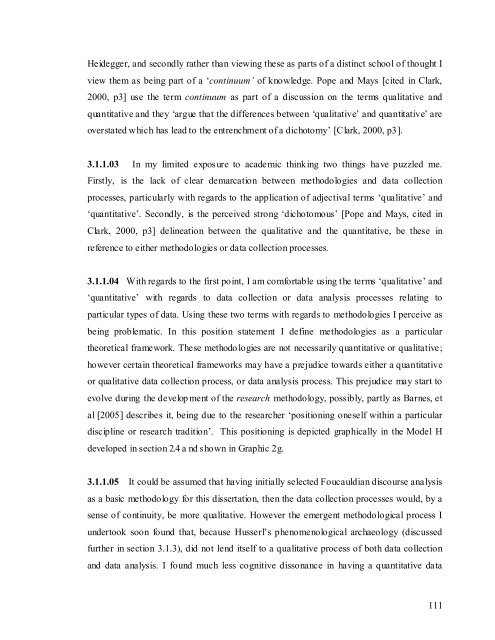Mapping the aliran of the academic discipline of entrepreneurship: A ...
Mapping the aliran of the academic discipline of entrepreneurship: A ...
Mapping the aliran of the academic discipline of entrepreneurship: A ...
Create successful ePaper yourself
Turn your PDF publications into a flip-book with our unique Google optimized e-Paper software.
Heidegger, and secondly ra<strong>the</strong>r than viewing <strong>the</strong>se as parts <strong>of</strong> a distinct school <strong>of</strong> thought I<br />
view <strong>the</strong>m as being part <strong>of</strong> a ‘continuum’ <strong>of</strong> knowledge. Pope and Mays [cited in Clark,<br />
2000, p3] use <strong>the</strong> term continuum as part <strong>of</strong> a discussion on <strong>the</strong> terms qualitative and<br />
quantitative and <strong>the</strong>y ‘argue that <strong>the</strong> differences between ‘qualitative’ and quantitative’ are<br />
overstated which has lead to <strong>the</strong> entrenchment <strong>of</strong> a dichotomy’ [Clark, 2000, p3].<br />
3.1.1.03 In my limited exposure to <strong>academic</strong> thinking two things have puzzled me.<br />
Firstly, is <strong>the</strong> lack <strong>of</strong> clear demarcation between methodologies and data collection<br />
processes, particularly with regards to <strong>the</strong> application <strong>of</strong> adjectival terms ‘qualitative’ and<br />
‘quantitative’. Secondly, is <strong>the</strong> perceived strong ‘dichotomous’ [Pope and Mays, cited in<br />
Clark, 2000, p3] delineation between <strong>the</strong> qualitative and <strong>the</strong> quantitative, be <strong>the</strong>se in<br />
reference to ei<strong>the</strong>r methodologies or data collection processes.<br />
3.1.1.04 With regards to <strong>the</strong> first point, I am comfortable using <strong>the</strong> terms ‘qualitative’ and<br />
‘quantitative’ with regards to data collection or data analysis processes relating to<br />
particular types <strong>of</strong> data. Using <strong>the</strong>se two terms with regards to methodologies I perceive as<br />
being problematic. In this position statement I define methodologies as a particular<br />
<strong>the</strong>oretical framework. These methodo logies are not necessarily quantitative or qualitative;<br />
however certain <strong>the</strong>oretical frameworks may have a prejudice towards ei<strong>the</strong>r a quantitative<br />
or qualitative data collection process, or data analysis process. This prejudice may start to<br />
evolve during <strong>the</strong> develop ment <strong>of</strong> <strong>the</strong> research methodology, possibly, partly as Barnes, et<br />
al [2005] describes it, being due to <strong>the</strong> researcher ‘positioning oneself within a particular<br />
<strong>discipline</strong> or research tradition’. This positioning is depicted graphically in <strong>the</strong> Model H<br />
developed in section 2.4 a nd s hown in Graphic 2g.<br />
3.1.1.05 It could be assumed that having initially selected Foucauldian discourse analysis<br />
as a basic methodology for this dissertation, <strong>the</strong>n <strong>the</strong> data collection processes would, by a<br />
sense <strong>of</strong> continuity, be more qualitative. However <strong>the</strong> emergent methodological process I<br />
undertook soon found that, because Husserl’s phenomenological archaeology (discussed<br />
fur<strong>the</strong>r in section 3.1.3), did not lend itself to a qualitative process <strong>of</strong> both data collection<br />
and data analysis. I found much less cognitive dissonance in having a quantitative data<br />
111

















